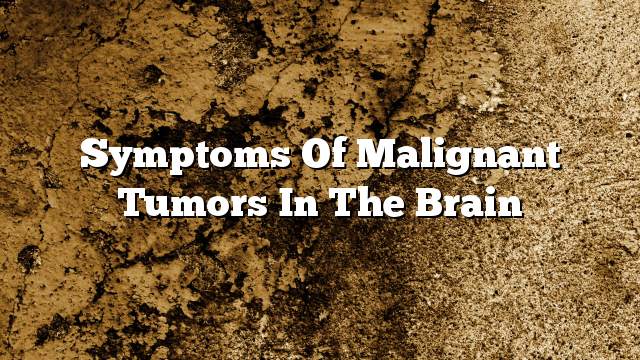The tumor
The tumor is defined as an accumulation of abnormal cells that leads to the formation of a mass of tissues. It disrupts the life cycle of cells in which older cells die and are replaced by new cells. Cancer cells do not die and continue to grow despite the body’s need for them. Mass continuously.
Difference between malignant tumor and benign tumor
The malignant tumor differs from the benign tumor in several ways, the most important of which is that the malignant tumor is cancerous, the benign tumor is not cancerous, and the growth rate of the malignancy is greater than the growth rate of the benign tumor. The two types of tumors resemble the recurrence after resection, Hamid tends not to reappear. Although benign tumors are not as aggressive as malignant tumors, they may sometimes be dangerous or life-threatening.
Brain tumors and types
There are many types of brain tumors, including the initial tumor that begins in the brain, secondary or diffuse, which starts from another place in the body and then spread to the brain, and that the benign (non-cancerous), and malignant (cancerous), including slow growth, And rapid growth.
Symptoms of malignant tumors in the brain
Brain tumors generally cause intracranial pressure as a result of brain swelling or tumor growth, or blocked cerebrospinal fluid CSF. This pressure leads to many symptoms, including:
- Headaches.
- Epileptic seizures.
- The coma.
- Nausea and vomiting.
- Balance disorders.
- Unclear vision.
- Changes in personality or behavior.
Brain tumors also cause specific symptoms based on the area in which they occur, but this does not mean that the symptoms to be mentioned later necessarily mean that the person is infected with malignant tumor, may be caused by any disease in the region, including the following symptoms:
- Tumors that are located in the back of the brain (the brain is the large outer area of the brain) or around the pituitary, optic nerve or other particular cranial nerves may lead to visual problems.
- Tumors that are located in the front of the brain may affect personality, thinking and language.
- Tumors that are located in the parts of the brain that control sensation and movement may lead to numbness and weakness in the body, usually in one hand.
- Tumors that occur in the brain or next to the areas responsible for the language may cause problems in understanding or uttering the words.
- Tumors that are located in the cerebellum, which controls the consistency may lead to problems in the exercise of the person’s daily activities, including eating and walking.
- Tumors that are located in a region of the brain known as the basal ganglia may cause the body to take abnormal positions and perform abnormal movements.
- Tumors that are located in the vicinity of the cranial nerves may lead to balance problems, loss of hearing, trouble swallowing, and weakness in some facial muscles.
Causes of brain tumors
Research has shown that there are only a few factors that increase the risk of brain cancer, so the cause of the disease is still complex. For example, people with specific genetic diseases, including Li-Fraumeni syndrome ) Are more likely to develop brain tumors, as are children who are exposed to radiation therapy. But these are a small part of the incidence, and those over the age of 65 years are more likely than four years to be infected with brain tumors four times.
Treatment of brain tumors
Although some tumors can not be accessed by surgery, the surgery to remove the tumor is the first therapeutic option immediately after diagnosis. If the tumor can not be surgically removed, radiotherapy and chemotherapy are used to reduce or even kill the tumor, Radiotherapy and chemotherapy are also used after surgery to kill the remaining cancer cells. In addition, Gamma Knife, a high-concentration radiation therapy, can be used.
The long-term effects and side effects of any treatment chosen before application should be discussed, as these treatments may also destroy healthy cells. Therefore, the doctor should clarify the importance of rehabilitation therapy after brain tumor therapy. Rehabilitation treatments that may be used include the following:
- Speech therapy: In order to address the problems of expressing thoughts, talking and even swallowing.
- Occupational Therapy: In order to improve the ability to exercise daily activities, including wearing clothes and entering the bathroom.
- natural therapy: So as to restore balance and strength.
Alternative therapy and complementary treatment of brain tumors
There has not been much research on alternative therapy and complementary treatment for brain cancer. No role has been shown in the treatment of brain tumors, but complementary therapy may help control the symptoms of these tumors and their side effects. Complementary therapies that may help the patient include:
- Hypnotherapy.
- Relaxation therapy.
- Meditation therapy.
